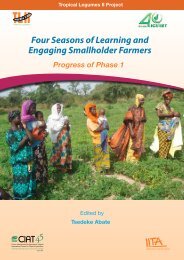Sorghum - icrisat
Sorghum - icrisat
Sorghum - icrisat
Create successful ePaper yourself
Turn your PDF publications into a flip-book with our unique Google optimized e-Paper software.
ICRISAT-Private Sector <strong>Sorghum</strong> Hybrid Parents<br />
Research Consortium: ICRISAT, in the beginning,<br />
interacted with scientists in private sector seed<br />
companies on an informal basis and supplied to<br />
them wide range of breeding products. However,<br />
for enhanced farm level adoption of hybrids<br />
developed from ICRISAT’s intermediate/products,<br />
ICRISAT-led private sector <strong>Sorghum</strong> Hybrid Parents<br />
Research Consortium has been operational since<br />
2000. The impacts of this consortium are briefly<br />
described below.<br />
Cultivar adoption: The ICRISAT-PS partnership has<br />
greatly contributed to development and marketing<br />
of improved hybrids and varieties in Asia. In India,<br />
more than 4 million ha (80% of the total) of rainy<br />
season sorghum are planted with about 70 PSbased<br />
hybrids, of which 54 are based on ICRISATderived<br />
parental lines. These hybrids have made<br />
substantial contributions to enhance genetic<br />
diversity, productivity, yield stability, and also<br />
improved the livelihoods of poor farmers in the<br />
dry areas (Gowda et al. 2003). Scientists’ Field<br />
Days and meetings provide opportunity for private<br />
seed companies to select breeding materials and<br />
to elicit feedback on the usefulness of materials,<br />
and also to set priorities (such as farmer or trade<br />
or industry preferences) for future research.<br />
Benefits from seed production: Farmers on an<br />
average produced about 3.0 t ha -1 hybrid seed of<br />
JKSH 22, an ICRISAT-private sector partnership<br />
hybrid to obtain a profit of Indian Rs. 29,500<br />
(US$630). Between 1994 and 2002, JKSH 22 seed<br />
production earned farmers, on an average, US$0.3<br />
million per year. Based on the seed sales of JKSH<br />
22, farmers in Maharashtra and other sorghum<br />
growing areas in India have earned an average of<br />
US$2.7 million every year for the last nine years<br />
from cultivating JKSH 22. Several seed villages in<br />
Andhra Pradesh and Karnataka states in India<br />
became prosperous by taking large scale hybrid<br />
seed production (personal communication from<br />
Ramakrishna 2003).<br />
It is estimated that on an average, hybrid seed<br />
production fetches US$630 ha -1 , about three times<br />
the price of commercial crop. In the last three years,<br />
a total of 29,800 t of certified hybrid seed of ICRISATprivate<br />
sector hybrids was produced (Table 9), which<br />
gave a total income of US$18.8 million in India.<br />
Livelihoods and the environment in these villages<br />
(roads, temples, new houses) got better as a result of<br />
higher income accrued from hybrid seed production.<br />
Table 9. Share of ICRISAT-private sector (PS)<br />
partnership sorghum hybrids seed production<br />
(certified) in total Indian sorghum seed<br />
production.<br />
PS hybrid seed<br />
Total certified<br />
Year Quantity (t) Percentage (%) seed (t)<br />
2001–02 11600 71 16410<br />
2002–03 7200 63 11390<br />
2003–04 11000 61 18000<br />
Total 29800 65 45800<br />
Resource mobilization: Sixteen PS seed companies<br />
working on sorghum in India, Egypt, Thailand and<br />
Indonesia have expressed their interest to join the<br />
revised <strong>Sorghum</strong> Hybrid Parents Research<br />
Consortium in 2004, which enables ICRISAT to<br />
mobilize financial resources to the tune of<br />
US$140,000 per year (Table 10) towards partial<br />
funding of crop improvement research at ICRISAT<br />
for developing elite sorghum hybrid parents to<br />
serve both public and private sectors. This resource<br />
mobilization is particularly significant at the crucial<br />
time of diminishing core funding to crop<br />
improvement research at ICRISAT. Thus, the Hybrid<br />
Parents Research Consortium for sorghum<br />
established at ICRISAT has emerged as a novel<br />
institution building for supporting agricultural<br />
research and enhancing impacts.<br />
Table 10. Status of sorghum ICRISAT-private<br />
sector Hybrid Parents Research Consortium<br />
members and total resource mobilized since its<br />
inception in the year 2000.<br />
No. of consortium Amount<br />
Year members accrued ($)<br />
2000 7 35000<br />
2001 9 45000<br />
2002 12 60000<br />
2003 12 60000<br />
2004 (up to June) 16 140000<br />
Total 340000<br />
22
















